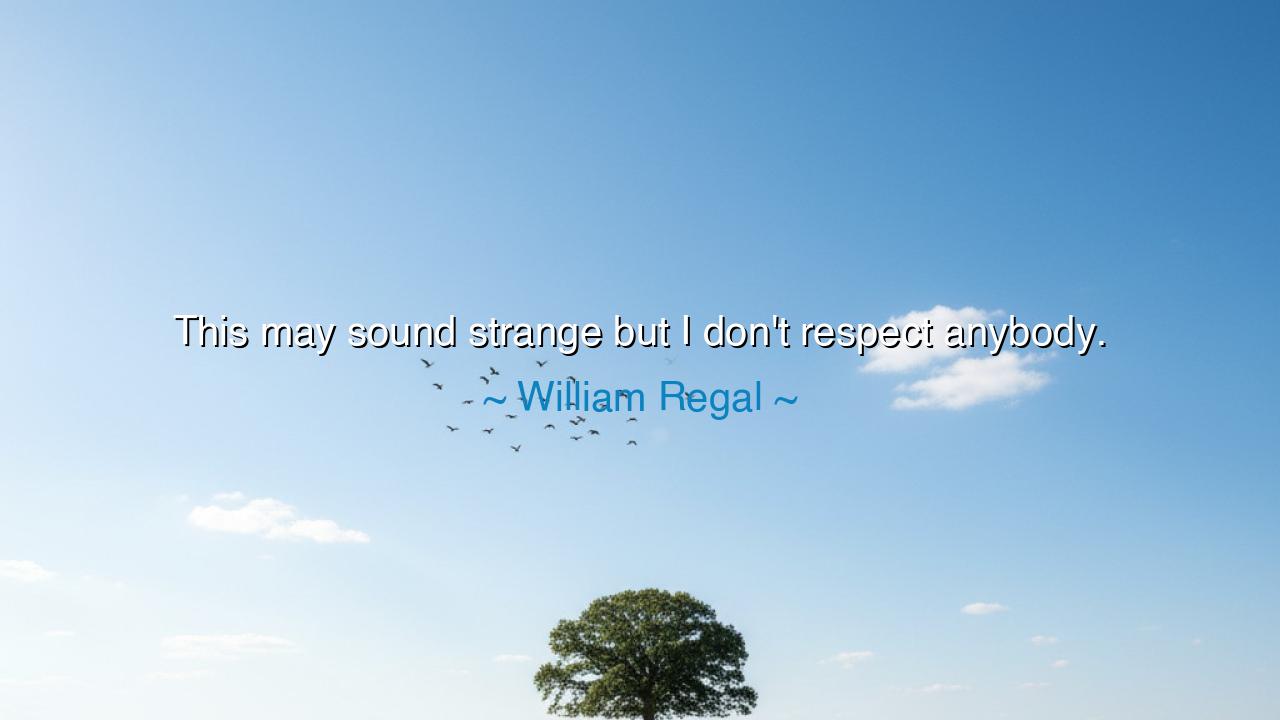
This may sound strange but I don't respect anybody.






“This may sound strange but I don't respect anybody.” Thus spoke William Regal, the man of iron discipline and cunning spirit — a warrior of the wrestling arena, but also a philosopher of struggle. At first, his words seem harsh, even arrogant, as though he were scorning the very essence of humility. But to those who listen with wisdom and patience, the deeper meaning becomes clear. For Regal is not rejecting the worth of others — he is rejecting idolatry, the blind reverence that weakens the will. His creed is one of self-reliance, of unyielding resolve, born from years of pain, humiliation, and the relentless pursuit of mastery.
In truth, when Regal declares, “I don’t respect anybody,” he speaks the language of the warrior’s mind — not contempt, but equality. He means that no man or woman, no opponent or master, stands above him in spirit. In his world, respect is not given by default — it is earned in battle, through discipline, endurance, and the courage to stand one’s ground. He has seen the false kings of pride fall and the humble rise in strength. He has learned that to place others upon pedestals is to lower oneself, and to fear others is to lose before the fight begins. His words, then, are a declaration of independence — a reminder that the soul of the warrior must bow to no one but the truth within.
William Regal’s path was not one of comfort. Born into the world of wrestling, he climbed his way through the hardest of schools — the brutal British carnivals and the unforgiving stages of global combat. Along the way, he faced ruin through his own mistakes, and redemption through discipline. He learned that respect cannot be demanded by titles, nor by applause. Too often, he saw men revere their heroes so much that they forgot to become heroes themselves. And so, his philosophy hardened: respect no one until they prove themselves worthy — and even then, never surrender your own dignity in the name of admiration.
The ancients, too, knew this truth. Alexander the Great, in his youth, revered Achilles, the hero of Homer’s song. But when he took the field himself, he learned that to truly honor Achilles, he must not worship him — he must surpass him. To be enslaved by awe is to become small. Yet to learn from greatness and then strive beyond it — that is the path to immortality. So too did William Regal come to understand that greatness lies not in imitation but in self-command. When he says he respects no one, he is, in truth, saying that he will not worship men, for he would rather walk beside giants than kneel before them.
And yet, Regal’s philosophy is not without humility. His strength lies not in arrogance, but in the clarity of self-knowledge. He knows that every man, no matter how skilled, is mortal; every champion, no matter how decorated, can fall. In this equality, there is both respect and defiance. For when you see all men as equal — neither gods to worship nor fools to scorn — you are free. You respect the fight, not the fame. You honor the work, not the name. In this way, Regal’s creed becomes a mirror of Stoic wisdom: “Respect none blindly, fear none unjustly, and measure all by the truth of their actions.”
Consider the tale of Marcus Aurelius, the Roman emperor and philosopher. Surrounded by flatterers and generals, he wrote in his meditations: “Do not be amazed at what others do, for you have the same nature within you.” This is Regal’s spirit made flesh — the refusal to bow to another’s shadow when your own light burns just as brightly. For to live in awe of others is to dim one’s own fire, and to live without reverence for false idols is to see the world with unclouded eyes.
So, my children, take this lesson to heart: respect all, but revere none. Do not let admiration become submission. Learn from the great, but never lose faith in your own power to become greater still. Do not seek validation from men, but from mastery — mastery of yourself, your craft, and your character. When Regal says he respects nobody, he means he will not allow another’s glory to diminish his own. And you must do the same.
Let this be your creed: honor the effort, not the ego; fear no one, envy no one, and kneel only to truth. For when you stand with such strength — calm, fearless, and unbent — you will find that even those who command respect will, in time, come to respect you. Thus spoke William Regal, the iron philosopher of the arena: that true respect is not given — it is earned through the mastery of one’s soul.






AAdministratorAdministrator
Welcome, honored guests. Please leave a comment, we will respond soon